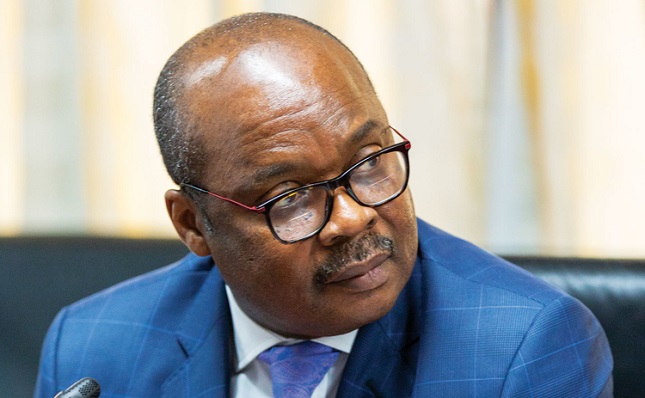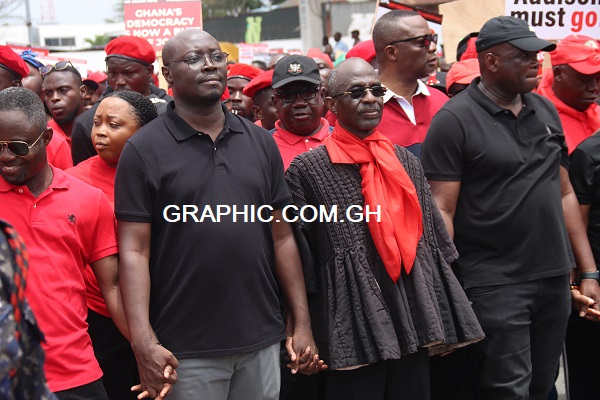
What BoG Governor Addison said in rejecting opposition calls to resign
The Bank of Ghana Governor, Dr Ernest Addison has told Central Banking that he rejects demands on him to resign made by the main opposition political party, the National Democratic Congress (NDC).
Advertisement
The Minority Members of Parliament from the National Democratic Congress, and some smaller groups took part in a march on the central bank’s headquarters on October 3 in a street protest dubbed #OccupyBoGProtest.
But Dr Ernest Addison in an interview with Central Banking, an international portal that reports on central banking issues said “the demonstration yesterday was completely unnecessary”, and neither he nor his deputies intend to step down. “The minority in parliament have many channels to channel their grievances.
Read the full report by the Central Banking below
Ghana’s governor rejects opposition calls to resign
The Bank of Ghana’s governor has told Central Banking he rejects demands on him to resign made by the country’s main opposition party.
The largest opposition party, the National Democratic Congress, and smaller groups took part in a march on the central bank’s headquarters on October 3. But Ernest Addison says “the demonstration yesterday was completely unnecessary”, and neither he nor his deputies intend to step down.
“The minority in parliament have many channels to channel their grievances in civilized societies, not through demonstrations in the streets as hooligans,” Addison says. He also rejected the opposition’s claims that the central bank had “unilaterally” used monetary financing, and its demand to end construction of a new headquarters.
Central bank officials declined to receive the parliamentary leader of the opposition, Cassiel Ato Forson, who wanted to present a petition. The central bank’s chief of security said the governor and deputy governors were in meetings with the International Monetary Fund.
The Bank of Ghana has struggled amid high inflation, scarce reserves and a wide-ranging restructuring of government debt. The government restructured its domestic debts earlier this year, which was the major factor behind the central bank’s 60.8 billion cedi ($5.24 billion) loss for 2022.
Ghana defaulted on part of its external debt in December 2022, and is currently in talks with its creditors. In May, the IMF approved a three-year, $3 billion loan.
Ato Forson has also objected to the construction of new central bank headquarters, scheduled to open next September. The project is estimated to cost $250 million.
called for Addison’s resignation in August, following the release of the central bank’s 2022 financial statements. His party has accused the central bank of funding the government by printing money.
At the protest, Ato Forson said the central bank’s leaders “have mismanaged the affairs of the central bank”. He said the central bank “has unilaterally printed up to 80 billion Ghana cedi in two years”, and of cancelling 48 billion cedi of state debt, without parliament’s approval.
“Governor Addison printed money to finance the champagne lifestyle of this president Akufo-Addo”, Ato Forson said. He said he would return and demand the governor meet opposition politicians.
Nana Akufo-Addo has been president of Ghana since early 2017, appointing Addison governor that year, and giving him a second term in 2021. He also appointed both of the serving deputy governors, Maxwell Opoku-Afari and Elsie Addo Awadzi.
Governor rejects claims
Addison tells Central Banking the central bank only provided monetary financing during 2020 and 2022, to meet specific crises. This is legal under the central bank law, he adds.
Regarding the central bank’s 2022 losses, Addison notes: “The impairment of the bank’s holdings of debt which led to the losses was a conditionality for the IMF programme. Nobody at Bank of Ghana forgave any debt.”
The governor states the Bank of Ghana decided to start the new headquarters in 2019. This was “when the bank was profitable and appropriated some of its profits for the new headquarters”, he says. “It was not a decision taken during a crisis.”
Since the end of last year, Ghana’s economic indicators have seen some improvement. Headline inflation has moderated somewhat from its peak last December of 54.1% year on year, coming in at 40.1% in August.
Advertisement
Gross international reserves – “excluding encumbered assets and petroleum funds” – increased by 40%, from $1.5 billion to $2.1 billion, between end-2022 and August. But the latter figure only equals one month’s import cover.
At the central bank’s last monetary policy press conference, Addison said Ghana’s economy was growing faster than the IMF had forecast. Ghana has more than doubled its policy rate since November 2021, from 13.5% to its current level of 30%.
Hundreds protest against BoG, hardship
Some principal streets of Accra were on Tuesday transformed into a sea of red and black when hundreds of protesters poured out in their numbers to register their displeasure over what they describe as the mismanagement of the Bank of Ghana (BoG).
Dubbed #OccupyBoGDemo, the protesters also drummed home their grievances about the current economic hardship, which they said had plunged many people into destitution, poverty and hopelessness.
Advertisement
It was a protest that represented all the macrocosm of the nation, with the young, old, disabled, women and men from all walks of life coming together to voice their concerns, and to let the world know what one protester called the “anger of the masses”.
Led by the Minority in Parliament and some leading members of the opposition National Democratic Congress (NDC), the protesters demanded the sacking of the Governor of the BoG, Dr Ernest Addison, and the Finance Minister, Ken Ofori-Atta, and a further shake-up of the government’s economic management team to turn the economy around.
Some of the leaders included the Minority Leader in Parliament, Dr Cassiel Ato Forson; the National Chairman of the NDC, Johnson Asiedu-Nketiah; the NDC Member of Parliament for Ningo Prampram, Sam George; the National Communication Officer of the NDC, Sammy Gyamfi, and the Director of Legal Affairs of the NDC, Godwin Kudzo Tameklo.
Patriotic songs

The protesters sang patriotic and war songs, and the national anthem as they moved.
Advertisement
Some of the placards read: “Debt is killing us”; “Bawumia, Ken, Addison, the day of reckoning is coming”; “Addison must go”; “Students are suffering”, “Misgovernor Addison”.
In scenes reminiscent of protests during the fight for independence, the protesters sat on the ground and sang patriotic songs when they got to the site of the construction of the new $250 million BoG headquarters at Ridge.
“While people on dialysis cannot afford the cost, with some dying, the BoG chose to build a new headquarters at such astronomical sum,” one of the leaders of the protest said, amid wild chants from the crowd.
A protester, who gave her name as Hajia Halima, said she joined the protest because of the tax slapped on sanitary pad.
Another protester called Adjei said he lost his job during the banking sector clean-up, and, therefore, joined the protest to remind the government of his suffering and that of others.
Why the protest?

The Minority in Parliament has accused Dr Addison and his deputies of running down the BoG, indulging in illegalities and aiding what it says is the government’s reckless spending by printing over GH¢22 billion to support the government’s budget, said to be outside the bank’s required threshold and without Parliament’s approval.
The BoG refutes the allegations, explaining that the amount claimed to have been printed represented net claims by the government and not new currency printed to support the government’s budget.
The accusation by the Minority in Parliament and the call for Dr Addison’s resignation followed the Annual Report and Financial Statement of the central bank, which revealed that the BoG had recorded a loss of GH¢60.8 billion, equivalent to $6 billion, and also recorded a negative equity of over GH¢55.1 billion.
Protest not over?

Meanwhile, it seems yesterday’s protest will not be the last of the #OccupyBoGDemo, with the leaders vowing to continue with the demonstration until the BoG Governor personally meets with them to collect their petition.
When the Minority leadership went to present its petition at the BoG, they were received by the Director of Safety and Security of the central bank, Wing Commander Kwame Asare Boateng (retd), and other members of the bank's leadership.
Wing Commander Boateng (retd) informed the Minority leadership that he would receive the petition on behalf of Dr Addison because he was in a meeting with some officials of the International Monetary Fund (IMF), and was, therefore, unavailable to receive the petition.
That did not go down well with the protest leaders, with the Minority Leader describing the absence of the Governor as disrespectful.
He vowed that the protest would continue until Dr Addison heeded their call.
“It is very disrespectful not to receive the petition himself. Not even the deputy is here, and we never said we were going to present our petition to security, and we would not give you the petition,” Dr Ato Forson said.
“Now that he has decided to disrespect us, we will not present our petition, and so we will go and come back again until we see him. This is just the beginning,” he added.

Standoff
A move by the protesters to terminate the protest at the BoG headquarters became a bone of contention between the organisers and the police, with the police insisting that the central bank premises was a security zone, and, therefore, not open for such mass picketing exercise.
This led to a legal action by the police to stop the demonstration from going ahead.
At yesterday’s protest, the police stood their grounds and approved a route which took the protesters from the central bank.
Per the approved route released by the police, the protestors were supposed to converge on the Obra Spot at the Kwame Nkrumah Circle Interchange, proceed to Adabraka, then to the Ridge Roundabout, move to the National Theatre Traffic Light intersection and to the Law Court Complex Traffic Light where they would then move to the Atta Mills Highway, make a U-turn at the National Lotteries and end the protests at the Independence Square.
However, the protesters — instead of going to the Independence Square to terminate the protest — decided to move to the BoG anyway, leading to a standoff between them and the police at the traffic light in front of the Kwame Nkrumah Memorial Park on the Atta Mills Highway.
As if anticipating their move, the police cordoned off the road to the BoG Headquarters from the traffic light intersection, with a strong barrier of riot police with tear gas canisters in front of the traffic light.
When the protesters initially reached the traffic light, some of them tried to break through the barricade, but they were prevented by their leaders, who insisted that they did not want any skirmishes with the police.
Eventually, the leaders of the protest, led by Dr Ato Forson, were allowed to cross the barricade to present their petition to the BoG, under police escort.




